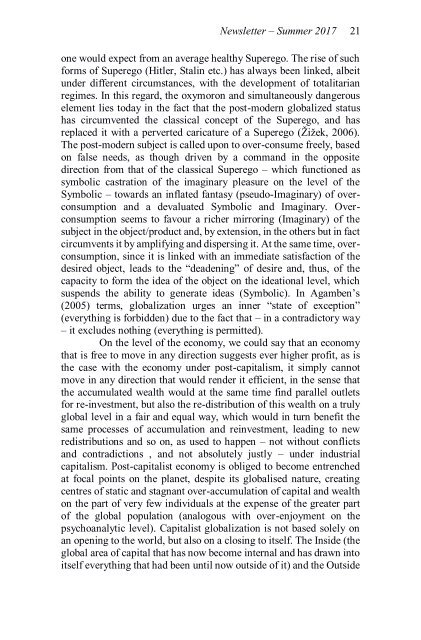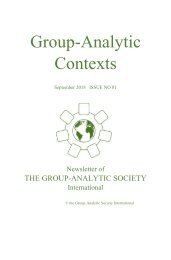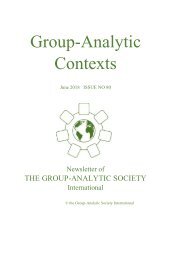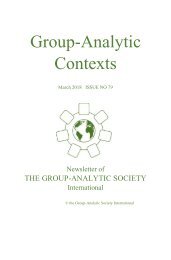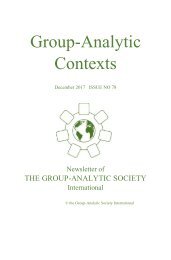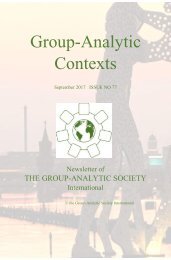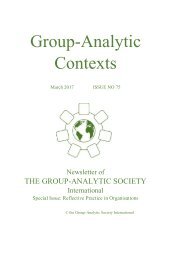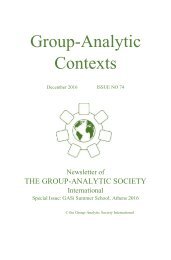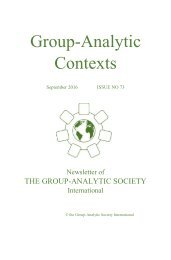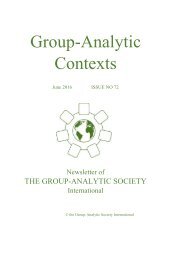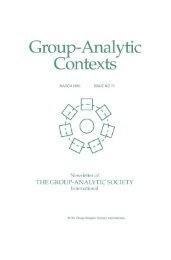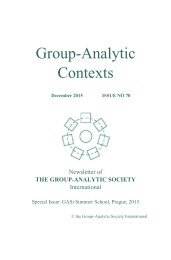Group-Analytic Contexts, Issue 76, June 2017
Special Issue: Preparing for the Berlin Symposium
Special Issue: Preparing for the Berlin Symposium
Create successful ePaper yourself
Turn your PDF publications into a flip-book with our unique Google optimized e-Paper software.
Newsletter – Summer <strong>2017</strong> 21<br />
one would expect from an average healthy Superego. The rise of such<br />
forms of Superego (Hitler, Stalin etc.) has always been linked, albeit<br />
under different circumstances, with the development of totalitarian<br />
regimes. In this regard, the oxymoron and simultaneously dangerous<br />
element lies today in the fact that the post-modern globalized status<br />
has circumvented the classical concept of the Superego, and has<br />
replaced it with a perverted caricature of a Superego (Žižek, 2006).<br />
The post-modern subject is called upon to over-consume freely, based<br />
on false needs, as though driven by a command in the opposite<br />
direction from that of the classical Superego – which functioned as<br />
symbolic castration of the imaginary pleasure on the level of the<br />
Symbolic – towards an inflated fantasy (pseudo-Imaginary) of overconsumption<br />
and a devaluated Symbolic and Imaginary. Overconsumption<br />
seems to favour a richer mirroring (Imaginary) of the<br />
subject in the object/product and, by extension, in the others but in fact<br />
circumvents it by amplifying and dispersing it. At the same time, overconsumption,<br />
since it is linked with an immediate satisfaction of the<br />
desired object, leads to the “deadening” of desire and, thus, of the<br />
capacity to form the idea of the object on the ideational level, which<br />
suspends the ability to generate ideas (Symbolic). In Agamben’s<br />
(2005) terms, globalization urges an inner “state of exception”<br />
(everything is forbidden) due to the fact that – in a contradictory way<br />
– it excludes nothing (everything is permitted).<br />
On the level of the economy, we could say that an economy<br />
that is free to move in any direction suggests ever higher profit, as is<br />
the case with the economy under post-capitalism, it simply cannot<br />
move in any direction that would render it efficient, in the sense that<br />
the accumulated wealth would at the same time find parallel outlets<br />
for re-investment, but also the re-distribution of this wealth on a truly<br />
global level in a fair and equal way, which would in turn benefit the<br />
same processes of accumulation and reinvestment, leading to new<br />
redistributions and so on, as used to happen – not without conflicts<br />
and contradictions , and not absolutely justly – under industrial<br />
capitalism. Post-capitalist economy is obliged to become entrenched<br />
at focal points on the planet, despite its globalised nature, creating<br />
centres of static and stagnant over-accumulation of capital and wealth<br />
on the part of very few individuals at the expense of the greater part<br />
of the global population (analogous with over-enjoyment on the<br />
psychoanalytic level). Capitalist globalization is not based solely on<br />
an opening to the world, but also on a closing to itself. The Inside (the<br />
global area of capital that has now become internal and has drawn into<br />
itself everything that had been until now outside of it) and the Outside


